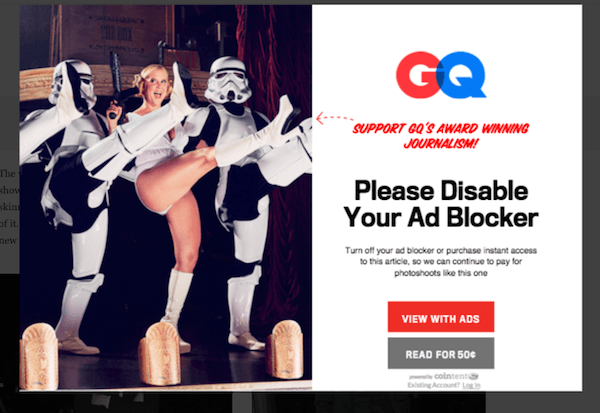GQ Website Gives Ultimatum To Readers: Disable Ad-Blockers Or Pay Up
 With ad-blocking apps and plugins preventing U.S. content companies from earning some $22 billion a year off your eyeballs, some sites are throwing down the gauntlet and demanding that readers pay up if they want to avoid ads.
With ad-blocking apps and plugins preventing U.S. content companies from earning some $22 billion a year off your eyeballs, some sites are throwing down the gauntlet and demanding that readers pay up if they want to avoid ads.
The latest attempt to prevent people from blocking ads comes from Conde Nast, a company that loves advertising so much that it created an entire boutique salon of highly-skilled editors dedicated to creating advertisements that look like articles.
Digiday recently reported that folks who visited Conde Nast’s GQ.com while using an ad-blocker were greeted with a paywall.
“Please Disable Your Ad Blocker” reads the notice.
“Turn off your ad blocker or purchase instant access to this article, so we can continue to pay for photoshoots like this one,” it concludes, pointing to an image of Amy Schumer dancing with stormtroopers.
Readers who choose to pay for their content rather than view GQ.com’s ads for beard oil and expensive clothing are directed to start an account with content, a micropayment company that allows you to pay the $.50 fee to read whatever story you were trying to reach.
Perhaps GQ.com should do a little “man-in-the-mirror”-ing on this, and ask itself “Why do some of our readers block the ads that keep this site afloat?”
It might have something to do with the ad units that GQ.com uses. Just clicking on a random story on the site turned up two auto-play video ads, both of which slow down the page’s load time significantly.
It’s like turning on a TV station and having ads that not only interrupt the program, talk over it.
The online ad industry itself has acknowledged that it’s gone too far with data-heavy, invasive, and pervasive ads, but rather than content companies responding by providing ads that don’t drive readers to ad-blocking tech, they just layer on more auto-play crap that readers will ignore with or without an ad-blocker.
Conde joins the ranks of Yahoo, which recently started blocking Yahoo Mail access to users with ad-blocking plugins, and Forbes, which is now flagging ad-block users and politely asking them to turn off their plugins.
Want more consumer news? Visit our parent organization, Consumer Reports, for the latest on scams, recalls, and other consumer issues.

